小学英语四种时态的区分及练习完整版
- 格式:docx
- 大小:60.69 KB
- 文档页数:5
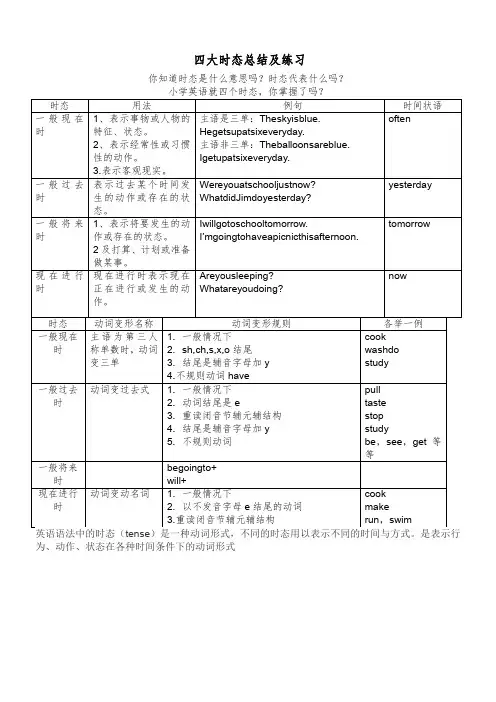
四大时态总结及练习你知道时态是什么意思吗?时态代表什么吗?小学英语就四个时态,你掌握了吗?时态用法例句时间状语一般现在时1、表示事物或人物的特征、状态。
2、表示经常性或习惯性的动作。
3.表示客观现实。
主语是三单:Theskyisblue.Hegetsupatsixeveryday.主语非三单:Theballoonsareblue.Igetupatsixeveryday.often一般过去时表示过去某个时间发生的动作或存在的状态。
Wereyouatschooljustnow?WhatdidJimdoyesterday?yesterday一般将来时1、表示将要发生的动作或存在的状态。
2及打算、计划或准备做某事。
Iwillgotoschooltomorrow.I’mgoingtohaveapicnicthisafternoon.tomorrow现在进行时现在进行时表示现在正在进行或发生的动作。
Areyousleeping?Whatareyoudoing?now时态动词变形名称动词变形规则各举一例一般现在时主语为第三人称单数时,动词变三单1. 一般情况下2. sh,ch,s,x,o结尾3. 结尾是辅音字母加y4.不规则动词havecookwashdostudy一般过去时动词变过去式 1. 一般情况下2. 动词结尾是e3. 重读闭音节辅元辅结构4. 结尾是辅音字母加y5. 不规则动词pulltastestopstudybe,see,get等等一般将来时begoingto+ will+现在进行时动词变动名词 1. 一般情况下2. 以不发音字母e结尾的动词3.重读闭音节辅元辅结构cookmakerun,swim英语语法中的时态(tense)是一种动词形式,不同的时态用以表示不同的时间与方式。
是表示行为、动作、状态在各种时间条件下的动词形式多加练习,百战不殆之时态一、选择最佳的答案:1.____Aliceoftenplaythepiano?No,she_____.A.Do;doB.Does;doesC.Does;doesn't2.___yourpenpal__inBeijing?A.Do;liveB.Do;livesC.Does;live3.TomandMike__veryexcited,theywilltakeatrip.A.isB.areC.am4.Ilike________verymuch.Whataboutyou?A.danceB.dancedC.dancing5.Thekite____abird.A.looklikeB.islookingC.lookslike6.BillandI___goodfriends.A.isB.areC.am7.Sandyoften___hishomeworkonSundays.A.doB.doesC.did8.Whatdoyouusuallydoontheweekend?I__________.A.wentswimmingB.goswimmingC.visitedgrandparents9.Whatdoyouusuallydoonyourholiday?Iusually__________.A.sawelephantsB.singanddanceC.tookpicture10.I____astudent.Igotoschool____buseveryday.A.is;byB.am;onC.am;by11.I____abrother.She____asister.A.have;hasB.has;hasC.have;have12.You____astudent.He____ateacher.A.is;isB.are;isC.are;are13.Healways_____footballgames.A.watchesB.watchC.doesn't14.Mybestfriend_____shells.A.collectsB.collectC.often15.Shedoesn’t_____listeningtothemusic.A.oftenB.likeC.likes16.MymotherandI___alwayswatchromanticfilms.A.doesn’tB.don’tC.do17.---When_____heusuallygethomeonFriday?----HeusuallygetshomeatfouronFriday.A.doB.doesC.did18,.Summer_________spring.esafteresinesbefore19.Everyone____totheirteacherintheclassroom.A.arelisteningB.islisteningC.listen20.Theyaresingingand___togetheratthepartynow.A.danceB.dancedC.dancing21.Listen!Thebirds____.A.issingingB.aresingC.aresinging22.Look!Thekite___inthesky.A.flyB.fliesC.isflying23.They____ridingaforse.A.isB.areC.am24.Kate____playingchess.A.amB.isC.are25.Areyouwashingclothes?A.Yes,youareB.Yes,IamC.No,Iam26.Ishe____TV?Yes,heis.A.watchB.watchingC.not27.____theytakingpictures.?Yes,theyare.A.AmB.BeC.Are28.It’s10o’clock.Ben_____TVinthebedroom.A.watchB.iswatchingC.watches29.I___presentsformyparentsyesterday.A.buyedB.boughtC.buying30.Susan_____swimmingyesterday.A.goB.goesC.went31.Danny_____breakfastfivetimeslastweek.A.eatB.ateC.eatedstSunday____TreePlantingDay.A.isB.wereC.was33.I____alotfromourtextbook.A.learnedB.learnesC.learning34.We____tothezooand___alotofanimalsyesterday.A.go;seeB.went;sawC.goes;sees35.Whatdidyoudolastweekend?--I_________A.readabookB.washtheclothesC.gofishing36.Whatdidyoudoonyourholiday?I________A.boughtapresentB.goskiingC.learnEnglish37.Whatdidhe_____yesterday?He____hishomework.A.did;didB.do;didC.do;do38.YesterdaymypresentsandI____ourhouse.A.werecleaningB.cleanedC.aregoingtoclean39.What_____totreesinthedifferentseasons?A.happenB.happensC.happenedstsummer.I____inthelakeandplayedonthebeach.A.swimB.swamC.willswim41.DidyoueatgoodfoodinChina?______.A.Yes,IdoB.No,Ididn’tC.No,Idid42.Weplayedbasketball_____.A.sometimesB.onSaturdaysstSaturday43.I’mgoingto___somechopsticks___Sundayafternoon.A.bought;onB.buy;onC.buy;on44.WhenareyougoingtoHongKong?I’mgoingthere____.A.thisweekendB.byplaneC.yesterday45.I’mgoingto____myfriendsthisweekend.A.visitB.visitedC.visiting46.I’mgoingto____homeworktomorrow.A.doesB.doC.did47.Areyougoingtotakeapianoclass?____A.No,wenotB.No,IamC.Yes,Iam48.Iam___eatbreakfastat7:15.A.willB.goingtoC.shall49.Wearegoingto____totheparktomorrow.A.goB.goesC.going50.Whatfilmareyougoingto______?A.seeB.watchC.look51.We_____aplaytomorrow.Willyoupleasejoinus?A.aregoingtoseeB.sawC.sees52.He___aracewithMingMing.A.shallhaveB.willhaveC.goingtohave53.Where_____yougotomorrow?A.areB.willC.shall54.___hisbrothergoingtoclimbmountains?A.IsB.AreC.Am55.Look!It_____.A.willsnowingB.isgoingtosnowC.snows56.I____freethisafternoon.A.beB.willbeC.goingtobe57.Theywill____roastducksinBeijing.A.ateB.eatsC.eat58.I__visitmyfriendsthisweekend.A.gotoB.amgoingtoC.goingto二、按照要求改写句子1.DanielwatchesTVeveryevening.(改为否定句)___________________________________________________2.Idomyhomeworkeveryday.(改为一般疑问句,作否定回答)________________________________________________________ 3.Shelikesmilk.(改为一般疑问句,作肯定回答)___________________________4.Amylikesplayingcomputergames.(改为一般疑问句,作否定回答)___________________________________________________5.Iliketakingphotosinthepark.(对划线部分提问)________________________________________________________ 6.JohncomesfromCanada.(对划线部分提问)___________________________________________________7.Nancyisgoingtogocamping.(改否定)??Nancy________goingtogocamping.1.I’llgoandjointhem.(改否定)??I_______go______jointhem.2.I’mgoingtogetupat6:30tomorrow.(改一般疑问句)??_______________________togetupat6:30tomorrow?3.Wewillmeetatthebusstopat10:30.(改一般疑问句)??_______________meetatthebusstopat10:30.4.Sheisgoingtolistentomusicafterschool.(对划线部分提问)??_______________she_________________________afterschool?5.Myfatherandmotheraregoingtoseeaplaythedayaftertomorrow.(同上) ??__________________goingtoseeaplaythedayaftertomorrow.1.Therewasacarinfrontofthehousejustnow.否定句:________________________________________________ 一般疑问句:____________________________________________ 肯、否定回答:__________________________________________ 肯、否定回答:__________________________________________一.按要求改写句子2.Theboyisplayingbasketball.否定句:____________________________一般疑问句:_________________________肯定回答:__________________________否定回答:__________________________对“isplayingbasketball”提问:__________________________对“Theboy”提问:__________________________3.Theyaresingingintheclassroom.否定句:____________________________一般疑问句:_________________________肯定回答:__________________________否定回答:__________________________对“aresinging”提问:__________________________对“intheclassroom”提问:__________________________三、用括号内动词的适当形式填空。
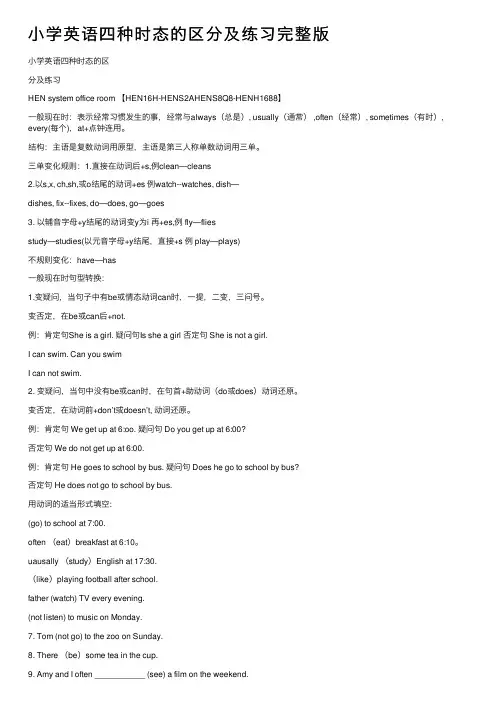
⼩学英语四种时态的区分及练习完整版⼩学英语四种时态的区分及练习HEN system office room 【HEN16H-HENS2AHENS8Q8-HENH1688】⼀般现在时:表⽰经常习惯发⽣的事,经常与always(总是), usually(通常) ,often(经常), sometimes(有时), every(每个),at+点钟连⽤。
结构:主语是复数动词⽤原型,主语是第三⼈称单数动词⽤三单。
三单变化规则:1.直接在动词后+s,例clean—cleans2.以s,x, ch,sh,或o结尾的动词+es 例watch--watches, dish—dishes, fix--fixes, do—does, go—goes3. 以辅⾳字母+y结尾的动词变y为i 再+es,例 fly—fliesstudy—studies(以元⾳字母+y结尾,直接+s 例 play—plays)不规则变化:have—has⼀般现在时句型转换:1.变疑问,当句⼦中有be或情态动词can时,⼀提,⼆变,三问号。
变否定,在be或can后+not.例:肯定句She is a girl. 疑问句Is she a girl 否定句 She is not a girl.I can swim. Can you swimI can not swim.2. 变疑问,当句中没有be或can时,在句⾸+助动词(do或does)动词还原。
变否定,在动词前+don’t或doesn’t, 动词还原。
例:肯定句 We get up at 6:oo. 疑问句 Do you get up at 6:00?否定句 We do not get up at 6:00.例:肯定句 He goes to school by bus. 疑问句 Does he go to school by bus?否定句 He does not go to school by bus.⽤动词的适当形式填空:(go) to school at 7:00.often (eat)breakfast at 6:10。
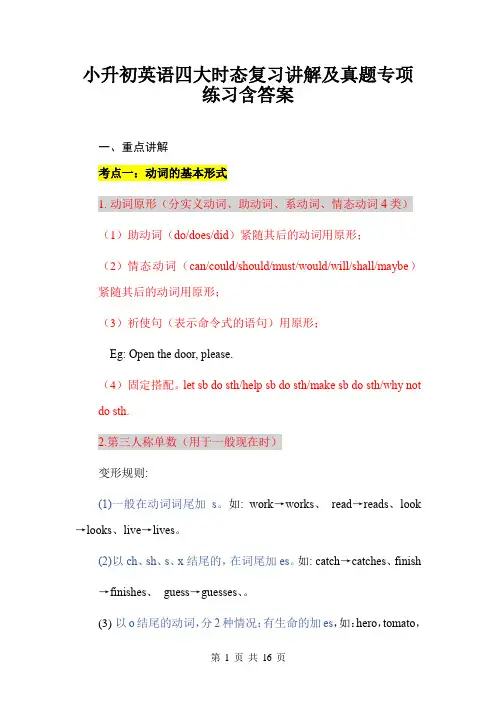
小升初英语四大时态复习讲解及真题专项练习含答案一、重点讲解考点一:动词的基本形式1.动词原形(分实义动词、助动词、系动词、情态动词4类)(1)助动词(do/does/did)紧随其后的动词用原形;(2)情态动词(can/could/should/must/would/will/shall/maybe)紧随其后的动词用原形;(3)祈使句(表示命令式的语句)用原形;Eg: Open the door, please.(4)固定搭配。
let sb do sth/help sb do sth/make sb do sth/why not do sth.2.第三人称单数(用于一般现在时)变形规则:(1)一般在动词词尾加s。
如: work→works、read→reads、look →looks、live→lives。
(2)以ch、sh、s、x结尾的,在词尾加es。
如: catch→catches、finish→finishes、guess→guesses、。
(3)以o结尾的动词,分2种情况:有生命的加es,如:hero,tomato,potato;没有生命的加s,如:radio,photo。
(4)以辅音字母加y结尾的动词,变y为ies。
如: fly→flies、study →studies、carry→carries.(5) 不规则变化。
如: have→has ,are→is,were→was3.现在分词(用于现在进行时)变形规则:(1)一般在动词后加ing。
如: work→working、read→reading、look →looking、wait→waiting。
(2)以不发音的e结尾的动词,去掉e,再加ing。
如: smile→smiling、move→moving、take→taking、write→writing。
(3)以重读闭音节结尾的且词尾只有一个辅音字母的,双写这个辅音字母加ing。
如: sit→sitting、stop→stopping、cut→cutting、run →running、swim→swimming.(4)少数几个以ie结尾的动词,将ie改为y加ing。
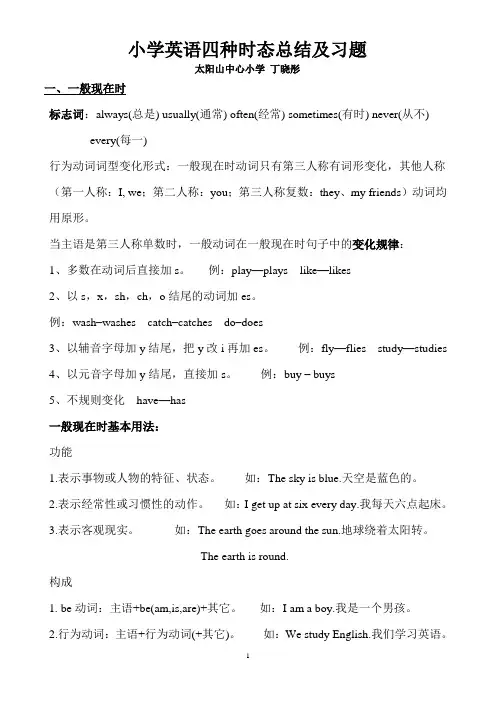
小学英语四种时态总结及习题太阳山中心小学丁晓彤一、一般现在时标志词:always(总是) usually(通常) often(经常) sometimes(有时) never(从不) every(每一)行为动词词型变化形式:一般现在时动词只有第三人称有词形变化,其他人称(第一人称:I, we;第二人称:you;第三人称复数:they、my friends)动词均用原形。
当主语是第三人称单数时,一般动词在一般现在时句子中的变化规律:1、多数在动词后直接加s。
例:play—plays like—likes2、以s,x,sh,ch,o结尾的动词加es。
例:wash–washes catch–catches do–does3、以辅音字母加y结尾,把y改i再加es。
例:fly—flies study—studies4、以元音字母加y结尾,直接加s。
例:buy – buys5、不规则变化have—has一般现在时基本用法:功能1.表示事物或人物的特征、状态。
如:The sky is blue.天空是蓝色的。
2.表示经常性或习惯性的动作。
如:I get up at six every day.我每天六点起床。
3.表示客观现实。
如:The earth goes around the sun.地球绕着太阳转。
The earth is round.构成1. be动词:主语+be(am,is,are)+其它。
如:I am a boy.我是一个男孩。
2.行为动词:主语+行为动词(+其它)。
如:We study English.我们学习英语。
句型肯定句:A. be动词:主语+ be + 其它成分如:He is a worker.B.行为动词:主语+动词(注意人称变化) +其它成分如:We like the little cat.否定句:A. be动词:主语+ be + not +其它成分如:They are not students.B.行为动词:主语+助动词(do/does) + not +动词原形+其它成分如:We don’t like the little cat.一般疑问句:A. be动词:Am / Is /Are +主语+ 其它成分如:Are you a teacher? Yes, I am. / No, I am not.Are they students of your school?Yes they are / No they aren’t.B.行为动词:助动词(Do/Does)+主语+动词原形+ 其它成分如:Do you like it? Yes, I do. / No. I don’t .Does he(she) like it? Yes, he( she )does. / No, he ( s he )doesn’t.特殊疑问句:疑问词+ 一般疑问句A. be动词:How many students are there in your school?B.行为动词:What do you usually do on Sunday?一般现在时动词be和have的变化形式1.动词Be 用法:第一人称单数用am,第三人称单数用is,其它人称用are。
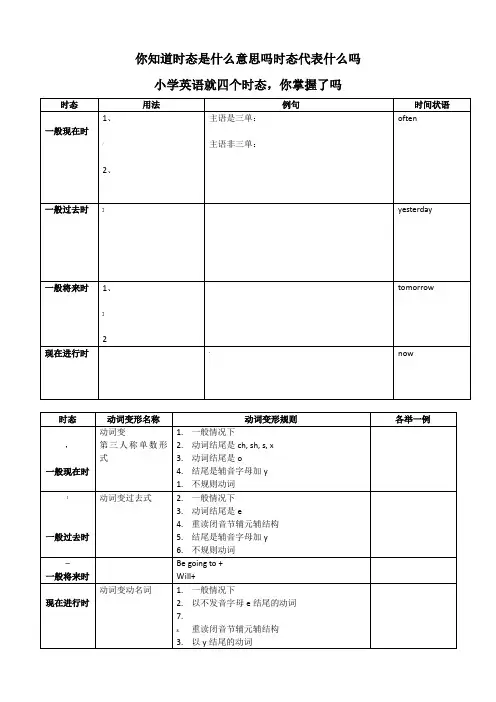
你知道时态是什么意思吗时态代表什么吗小学英语就四个时态,你掌握了吗你能发现它们之间的共同点和不同点吗勤加练习,百战不殆I.把下列动词变为第三人称单数形式。
1. clean--2. go--3. have--4.do-6. fly--7. come-- brush-9. watch-- 10. study-- 11. ask--(13. swim-- 14. catch-- 15. write--16. eat-- 17. make-- 18. paint—19. learn-- 20. phone-- 21. run—22. hop-- 23. sing-- 24. pick—II.把下列动词变成过去式is\am________ fly______ plant________are________ drink_________ play_______go________ make ______ does_________dance________ worry________ ask _____ taste_________ eat__________ draw________put ______ throw________kick_________ pass_______ do ________III.把下列动词变成动名词形式。
Wake________ make__________ come____________have____________!Take_________ leave__________ rid_________, regret__________, Begin________,cut________, get_________, hit_________, run_________, set_________, sit__________, spit__________, stop_________, swim________,beg_________, drop__________, fit_________, nod_________, dig___________, forget_________, travel_________visit_________Carry_________ enjoy___________ play ___________ study ________die_________ lie_________多加练习,百战不殆之时态篇一、用单词的正确形式填空:1.Mike _________ (do) his homework every day.2.There __________(be) some water in the glass.3.We like ________ (play) basketball after class.4.I like singing. I often _________(listen) to the music in the evening.5.【6.My grandma_________(watch) TV every day.二、判断句子的正误, 并改正。
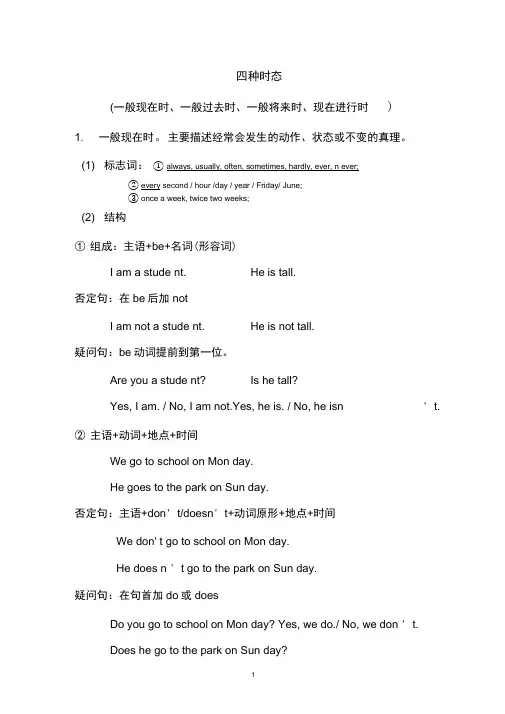
四种时态(一般现在时、一般过去时、一般将来时、现在进行时)1. 一般现在时。
主要描述经常会发生的动作、状态或不变的真理。
(1) 标志词:① always, usually, often, sometimes, hardly, ever, n ever;②every second / hour /day / year / Friday/ June;③once a week, twice two weeks;(2) 结构①组成:主语+be+名词(形容词)I am a stude nt. He is tall.否定句:在be后加notI am not a stude nt. He is not tall.疑问句:be动词提前到第一位。
Are you a stude nt? Is he tall?Yes, I am. / No, I am not.Yes, he is. / No, he isn ' t.②主语+动词+地点+时间We go to school on Mon day.He goes to the park on Sun day.否定句:主语+don' t/doesn' t+动词原形+地点+时间We don' t go to school on Mon day.He does n ' t go to the park on Sun day.疑问句:在句首加do或doesDo you go to school on Mon day? Yes, we do./ No, we don ' t.Does he go to the park on Sun day?Yes, he does./ No, he does n (3) 动词三单变化:① 在原单词末尾加s ,如:like - likes② 单词以 o, sh, ch, s, x 结尾力口 es,女口: go - goes ③ 单词末尾为辅音+y 结尾去y 加ies 女口: study- studies 2.现在进行时:主要叙述正在发生的事情。
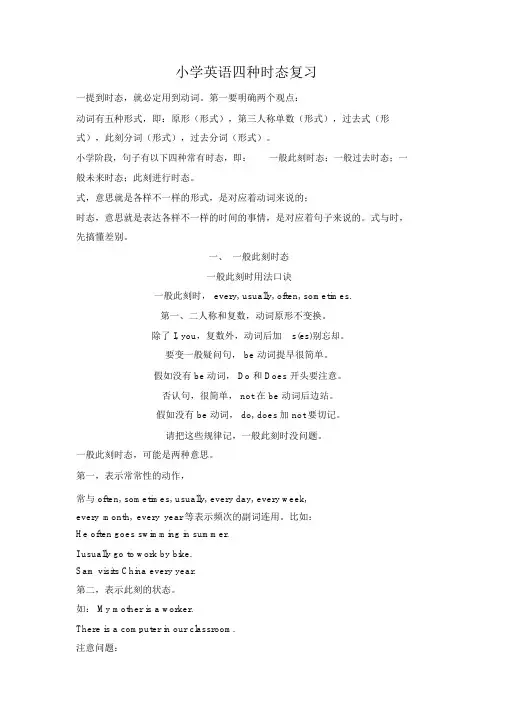
小学英语四种时态复习一提到时态,就必定用到动词。
第一要明确两个观点:动词有五种形式,即:原形(形式),第三人称单数(形式),过去式(形式),此刻分词(形式),过去分词(形式)。
小学阶段,句子有以下四种常有时态,即:一般此刻时态;一般过去时态;一般未来时态;此刻进行时态。
式,意思就是各样不一样的形式,是对应着动词来说的;时态,意思就是表达各样不一样的时间的事情,是对应着句子来说的。
式与时,先搞懂差别。
一、一般此刻时态一般此刻时用法口诀一般此刻时, every, usually, often, sometimes.第一、二人称和复数,动词原形不变换。
除了 I, you,复数外,动词后加s(es)别忘却。
要变一般疑问句, be 动词提早很简单。
假如没有 be动词, Do 和 Does 开头要注意。
否认句,很简单, not 在 be 动词后边站。
假如没有 be 动词, do, does加 not 要切记。
请把这些规律记,一般此刻时没问题。
一般此刻时态,可能是两种意思。
第一,表示常常性的动作,常与 often, sometimes, usually, every day, every week,every month, every year等表示频次的副词连用。
比如:He often goes swimming in summer.I usually go to work by bike.Sam visits China every year.第二,表示此刻的状态。
如: My mother is a worker.There is a computer in our classroom.注意问题:be (am, is, are)动词就是独立的谓语动词,一个句子中有了be(am, is, are)就有了谓语动词了。
句子中不可以同时出现两个谓语动词。
许多同学常常出这样的错误:The boy is often eats hamburgers(.错)应改为: The boy often eats hamburgers.二、此刻进行时态正在进行时态口诀此刻分词用途多,进行时态不用说。
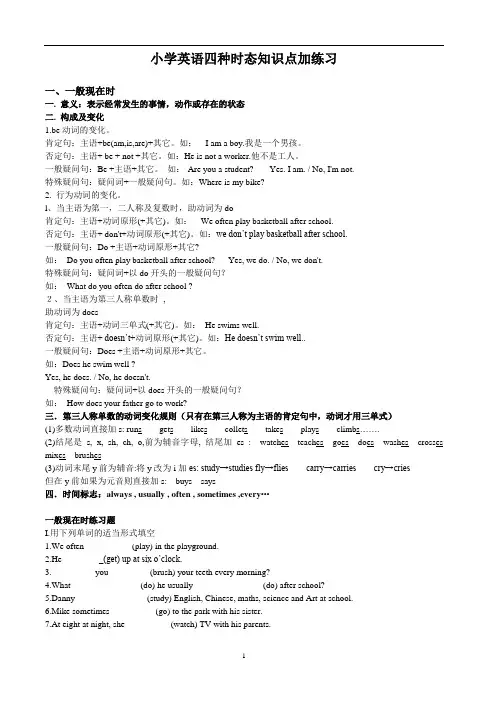
小学英语四种时态知识点加练习一、一般现在时一. 意义:表示经常发生的事情,动作或存在的状态二. 构成及变化1.be动词的变化。
肯定句:主语+be(am,is,are)+其它。
如:I am a boy.我是一个男孩。
否定句:主语+ be + not +其它。
如:He is not a worker.他不是工人。
一般疑问句:Be +主语+其它。
如:-Are you a student? -Yes. I am. / No, I'm not.特殊疑问句:疑问词+一般疑问句。
如:Where is my bike?2. 行为动词的变化。
l、当主语为第一,二人称及复数时,助动词为do肯定句:主语+动词原形(+其它)。
如:We often play basketball after school.否定句:主语+ don't+动词原形(+其它)。
如:we don’t play basketball after school.一般疑问句:Do +主语+动词原形+其它?如:Do you often play basketball after school? Yes, we do. / No, we don't.特殊疑问句:疑问词+以do开头的一般疑问句?如:What do you often do after school ?2、当主语为第三人称单数时,助动词为does肯定句:主语+动词三单式(+其它)。
如:He swims well.否定句:主语+ doesn’t+动词原形(+其它)。
如:He doesn’t swim well..一般疑问句:Does +主语+动词原形+其它。
如:Does he swim well ?Yes, he does. / No, he doesn't.特殊疑问句:疑问词+以does开头的一般疑问句?如:How does your father go to work?三.第三人称单数的动词变化规则(只有在第三人称为主语的肯定句中,动词才用三单式)(1)多数动词直接加s: runs gets likes collets takes plays climbs…….(2)结尾是s, x, sh, ch, o,前为辅音字母, 结尾加es :watches teaches goes does washes crosses mixes brushes(3)动词末尾y前为辅音:将y改为i加es: study→studies fly→flies carry→carries cry→cries但在y前如果为元音则直接加s:buys says四.时间标志:always , usually , often , sometimes ,every…一般现在时练习题I.用下列单词的适当形式填空1.We often___________(play) in the playground.2.He _________(get) up at six o’clock.3.__________you _________(brush) your teeth every morning?4.What________________(do) he usually________________(do) after school?5.Danny ________________(study) English, Chinese, maths, science and Art at school.6.Mike sometimes __________(go) to the park with his sister.7.At eight at night, she __________(watch) TV with his parents.8.________ Mike________(read) English every day?9.How many lessons_________your classmates________(have) on Monday?10.What time_________his mother_________(do) the housework?II.改句子1.Do you often play football after school? (改为肯定句)2.I have many books.(改为否定句)3.Gao Shan’s sister likes playing table tennis (改为否定句)4.She lives in a small town near New York.(改为一般疑问句)5.I watch TV every day.(改为一般疑问句)6.We have four lessons.(改为否定句)7.Nancy doesn’t run fast (改为肯定句)二、现在进行时一、概念现在进行时表示说话时正在进行或发生的动作,也可表示当前一段时间内的活动或现阶段正在进行的动作。
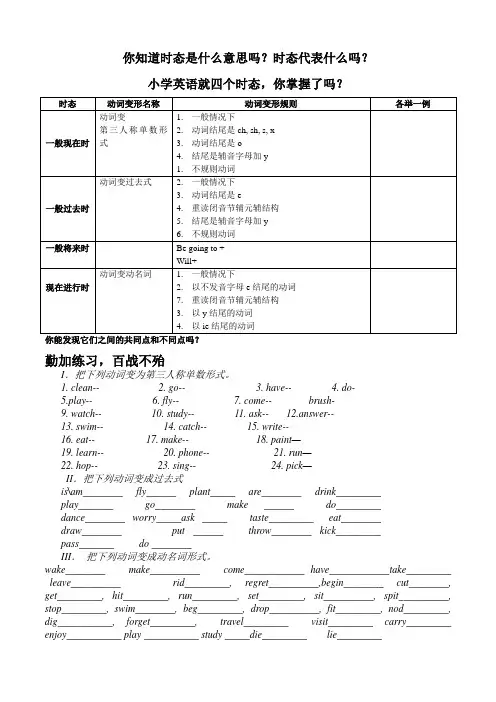
你知道时态是什么意思吗?时态代表什么吗?小学英语就四个时态,你掌握了吗?你能发现它们之间的共同点和不同点吗?勤加练习,百战不殆I.把下列动词变为第三人称单数形式。
1. clean--2. go--3. have--4. do-5.play--6. fly--7. come-- brush-9. watch-- 10. study-- 11. ask-- 12.answer--13. swim-- 14. catch-- 15. write--16. eat-- 17. make-- 18. paint—19. learn-- 20. phone-- 21. run—22. hop-- 23. sing-- 24. pick—II.把下列动词变成过去式is\am________ fly______ plant_____ are________ drink_________play_______ go________ make ______ do_________dance________ worry_____ask _____ taste_________ eat________draw________ put ______ throw________ kick_________pass_______ do ________III.把下列动词变成动名词形式。
wake________ make__________ come____________ have____________take_________ leave__________ rid_________, regret__________,begin________ cut________, get_________, hit_________, run_________, set_________, sit__________, spit__________, stop_________, swim________, beg_________, drop__________, fit_________, nod_________, dig___________, forget_________, travel_________ visit_________ carry_________ enjoy___________ play ___________ study _____die_________ lie_________多加练习,百战不殆之时态篇一、用单词的正确形式填空:1.Mike _________ (do) his homework every day.2.There __________(be) some water in the glass.3.We like ________ (play) basketball after class.4.I like singing. I often _________(listen) to the music in the evening.5.My grandma_________(watch) TV every day.三、选择最佳的答案:1. ____Alice often play the piano? No, she _____. A. Do; do B. Does; does C. Does; doesn't2. ___ your penpal __ in Beijing? A. Do; live B. Do; lives C. Does; live3. Tom and Mike __ very excited, they will take a trip. A. is B. are C. am4. I like ________ very much. What about you? A. dance B. danced C. dancing5. The kite ____ a bird. A. look like B. is looking C. looks like6. Bill and I ___ good friends. A. is B. are C. am7. Sandy often ___ his homework on Sundays . A. do B. does C. did8. What do you usually do on the weekend? I __________.A. went swimmingB. go swimmingC. visited grandparents9. What do you usually do on your holiday? I usually __________.A. saw elephantsB. sing and danceC.took picture10. I ____ a student. I go to school ____bus every day. A. is; by B. am; on C. am; by11. I ____ a brother. She ____ a sister. A. have; has B. has; has C. have; have12. You ____ a student. He ____ a teacher. A. is; is B. are; is C. are; are13. He always _____ football games. A. watches B. watch C. doesn't14. My best friend _____ shells. A. collects B. collect C. often15. She doesn’t _____ listening to the music. A. often B. like C. likes16. My mother and I ___ always watch romantic films. A. doesn’t B. don’t C. do17. ---When _____ he get home on Friday?----He gets home at four on Friday. A. do B. does C. did18.Summer _________ spring.A. comes afterB. comes ines before二、用单词的适当形式填空:1. look! Chen Jie and Mike are ___________(sing)now.2. The small bear is _____________ (climb) the tree.3. Mike is ________________ (draw) picture.4. She is ________________ (do) the dishes.5. My brother __________ (make) kites now.6. My father is ___________ (read) a newspaper in living room.7. Ted is __________(answer) the phone.8. My uncle is ____________ (drive) a car.9. The students are ______________(listen) to their teacher carefully.10. Chen Jie is _________(wash) clothes.11. His sister _______ (be) writing an e-mail.12. We ______(be) cleaning the classroom now.13. I____ (be)working on my computer.14. They _____ (be)playing basketball.15. Look, The tiger ________ __________(walk).16. Look, The elephants ______ _____________(drink) water with their trunk.17. Look, The monkeys ________ ___________ (swing).18. Peter _________ ______________(take) pictures now.19. They _____ ________(take)up the apples now.20. We _______ ________(catch) butterflies now.三、选择正确答案1. Every one ____ to their teacher in the classroom. A. are listening B. is listening C. listen2. They are singing and ___ together at the party now. A. dance B. danced C. dancing3. Listen! The birds ____. A. is singing B. are sing C. are singing4. Look! The kite ___ in the sky. A. fly B. flies C. is flying5. They ____ riding a forse. A. is B. are C. am6. Kate ____ playing chess. A. am B. is C. are7. Are you washing clothes? A. Yes, you are B. Yes, I am C. No, I am8. Is he ____ TV?Yes, he is. A. watch B. watching C. not9. ____ they taking pictures.? Yes, they are. A. Am B. Be C. Are10. It’s 10 o’clock. Ben _____ TV in the bedroom. A. watch B. is watching C. watches五、根据中文填空。

小学四种时态试题及答案一、时态简介时态是指动词所表示的时间形式,用于表达动作或状态在时间上的关系。
在英语中,常见的时态有四种:一般现在时、一般过去时、一般将来时和现在进行时。
每种时态都有其特定的用法和标志词,下面将提供一些小学生常见的时态试题及答案。
二、一般现在时1. 完成句子:a) She ___________ (play) tennis every weekend.Answer: playsb) They ___________ (watch) a movie now.Answer: watchc) The cat ___________ (sleep) in the sun.Answer: sleeps2. 变为否定句:a) He watches TV every day.Answer: He doesn't watch TV every day.b) We eat ice cream in summer.Answer: We don't eat ice cream in summer.c) She plays the piano very well.Answer: She doesn't play the piano very well.三、一般过去时1. 完成句子:a) We ________ (visit) the museum yesterday. Answer: visitedb) He ________ (clean) his room last night. Answer: cleanedc) They ________ (watch) a movie last weekend. Answer: watched2. 变为否定句:a) She played soccer yesterday.Answer: She didn't play soccer yesterday.b) They went to the park this morning. Answer: They didn't go to the park this morning.c) He ate pizza for dinner.Answer: He didn't eat pizza for dinner.四、一般将来时1. 完成句子:a) I ________ (visit) my grandparents next week. Answer: will visitb) She ________ (buy) a new bike tomorrow. Answer: will buyc) They ________ (have) a party on Saturday. Answer: will have2. 变为否定句:a) They will come to the cinema with us. Answer: They won't come to the cinema with us.b) He will finish his homework later. Answer: He won't finish his homework later.c) We will go swimming this afternoon. Answer: We won't go swimming this afternoon.五、现在进行时1. 完成句子:a) They ________ (read) a book at the moment. Answer: are readingb) I ________ (play) soccer with my friends now. Answer: am playingc) She ________ (watch) TV in the living room.Answer: is watching2. 变为否定句:a) He is eating lunch now.Answer: He isn't eating lunch now.b) We are studying English at school.Answer: We aren't studying English at school.c) They are playing basketball in the park.Answer: They aren't playing basketball in the park.六、总结以上是关于小学四种时态的试题及答案。
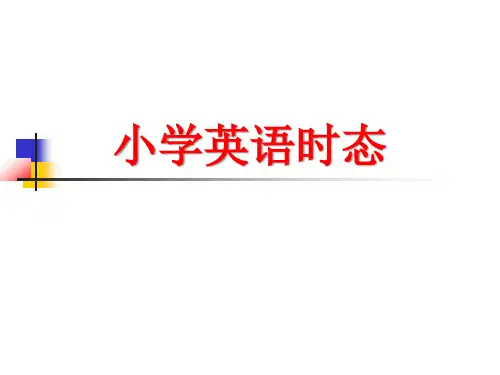
精心整理你知道时态是什么意思吗?时态代表什么吗?小学英语就四个时态,你掌握了吗?时态动词变形名称动词变形规则各举一例一般现在时动词变第三人称单数形式1.一般情况下2.动词结尾是ch, sh, s, x3.动词结尾是o4.结尾是辅音字母加y 1.不规则动词一般过去时动词变过去式 2.一般情况下3.动词结尾是e4.重读闭音节辅元辅结构5.结尾是辅音字母加y6.不规则动词一般将来时Be going to +Will+现在进行时动词变动名词 1.一般情况下2.以不发音字母e结尾的动词7.重读闭音节辅元辅结构3.以y结尾的动词4.以ie结尾的动词你能发现它们之间的共同点和不同点吗?勤加练习,百战不殆I.把下列动词变为第三人称单数形式。
1. clean--2. go--3. have--4. do-5.play--6. fly--7. come-- brush-9. watch-- 10. study-- 11. ask-- 12.answer--13. swim-- 14. catch-- 15. write--16. eat-- 17. make-- 18. paint—19. learn-- 20. phone-- 21. run—22. hop-- 23. sing-- 24. pick—II.把下列动词变成过去式is\am________ fly______ plant_____ are________ drink_________play_______ go________ make ______ do_________dance________ worry_____ask _____ taste_________ eat________draw________ put ______ throw________ kick_________pass_______ do ________III.把下列动词变成动名词形式。
小学英语四大时态总结及练习题1. 简单现在时(Simple Present Tense)用法:表示现在正在进行的事情,或者经常性、习惯性的动作或状态。
构成:主语+ 动词原形+ 其他肯定句:I play basketball every day.否定句:I don't play basketball every day.一般疑问句:Do you play basketball every day?练习题:1. The sun (rise) in the east.2. We (love) our parents very much.3. (Do) you like to eat ice cream?4. Tom (not like) to go to school.5. They (visit) Beijing last year.2. 简单过去时(Simple Past Tense)用法:表示在过去某个时间点已经结束的动作或状态。
构成:主语+ 动词过去式+ 其他肯定句:I played basketball yesterday.否定句:I didn't play basketball yesterday.一般疑问句:Did you play basketball yesterday?练习题:1. Mary (go) to the park yesterday.2. We (have) a party last night.3. (Did) you see the movie yesterday?4. Lucy (not want) to go to the zoo last week.5. They (visit) their grandparents last weekend.3. 现在进行时(Present Continuous Tense)用法:表示正在进行的动作。
构成:主语+ be动词(am, is, are)+ 动词ing + 其他肯定句:I am playing basketball now.否定句:I am not playing basketball now.一般疑问句:Are you playing basketball now?练习题:1. My sister (watch) TV at the moment.2. We (not study) English now.3. (Is) he swimming in the river?4. Lucy (not listen) to music now.5. They (play) volleyball in the park.4. 将来时(Future Tense)用法:表示将要发生的动作或状态。
4. 以o结尾的单词: 有生命加s 。
tomato-tomatoespotato-potatoes无生命加espiano-pianosphoto-photoszoo-zoosradio-radios小升初时态专题综合训练1.(成都市青羊区小学毕业卷)John _____ football.A. likes playingB. likes playC. like play2.(深圳市龙岗区小学毕业卷)Does your mother _____ football?A. likeB. likesC. like play3.(芜湖市第三中学招生卷)They usually _____ TV in the evening.A. watchB. will watchC. are watchingD. watches4.(上海市奉贤区小学毕业卷)—What do you usually do on the weekend?—I often ____.A. do my homeworkB. did my homeworkC. doing my homework5. (杭州市西湖区小学毕业卷)I don’t like _____ thril lers(恐怖片)______ playing baseball.A. watching; orB. watching; andC. to watch; or6.(菏泽市晨曦中学招生卷)Bob often _____ to school.A. walkB. walksC. walked7.(南昌铁路一中初中部招生卷)My pen ______ on my desk ten minutes ago.But it _____ there now.A. is; isn’tB. was; isn’tC. is; is8.(长沙市宁乡县小学毕业卷)Mike is _____ after his classmates.A. runsB. runingC. running9.(桂林市奎光学校招生卷)Be quiet! The babies ________.A. sleepB. are sleepingC. slept10. (武汉市青山区小学毕业卷)______ he _____ his homework yesterday?A. Does; doB. Did; didC. Did; do11(北京市朝阳区小学毕业卷)—What did you do last weekend?—I ______.A. go swimmingB. did my homeworkC. went swim12.(芜湖市第十一中学招生卷)—What’s your hobby?—_____ is my hobby.A. Collecting stampsB. Collect stampsC. Stamps13.(广州市白云区小学毕业卷)—Where were you just now?—I _____ at school.A. isB. wasC. were14.(武汉市青山区小学毕业卷)______ he ______ his grandparents lastmonth?A. Did; visitedB. Did; visitC. Do; visited15.(郑州市二七区小学毕业卷)Last week, we _____ a _____ race.A. hard; runningB. have; runningC. had; running16.(福州市仓山区小学毕业卷)I______ to the park last week.A. goB. wentC. going17.(合肥市蜀山区小学毕业卷)If I _____ you tomorrow, I will give youthe receipt(收据)。
完整版)小学四大时态的综合练习基础知识概念结构、时间状语、否定和一般疑问句在英语语法中,有一些基础知识是必须掌握的,包括概念结构、时间状语、否定和一般疑问句等。
其中,概念结构是指一个句子中的各个成分之间的关系;时间状语则是表示时间的词语,如ago、yesterday、the day before yesterday、last week 等;否定形式包括主语+am/is/are+not以及主语+don't/doesn't+动词原形等;一般疑问句则是以am/is/are或do/does开头的问句,如Am/Is/Are+主语+。
或Do/Does+主语+。
表示过去某个时间在表示过去某个时间的时候,我们可以使用was/were来表示过去发生的动作或者状态,也可以使用had来表示过去的惯性动作或状态。
例如,我们可以说yesterday I was very busy,表示昨天我非常忙碌;又如,when I was young。
I had a lot of friends,表示在我年轻的时候,我有很多朋友。
表示经常、反复发生的动作或行为如果我们想要表达经常、反复发生的动作或行为,可以使用is/am/are+动词原形/动词的第三人称单数形式,或者使用often、usually、always、never、sometimes、every week、oncea week、on Sundays等时间状语。
例如,I usually go to bed at11 o'clock,表示我通常在11点钟睡觉;又如,she is always late for class,表示她上课总是迟到。
表示现况和性质在表示现况和性质的时候,我们可以使用have/has+动词原形+一段时间(如week/year/month/night)、in 1989、just now、at the age of twelve、one day、long long ago等时间状语。
四种时态讲解和专项练习【一】一般现在时一、一般现在时的功能1.表示事物或人物的特征、状态。
如:The sky is blue.天空是蓝色的。
2.表示经常性或习惯性的动作。
如:I get up at six every day.我每天六点起床。
3.表示客观现实。
如:The earth goes around the sun.地球绕着太阳转。
二、一般现在时的构成1.当主语为第三人称单数(he, she,it)时,要在动词后加"-s"或"-es"。
如:Mary likes Chinese.玛丽喜欢汉语。
2.当主语为其他人称时,动词用原形。
三、标志词:often ,always ,usually, sometimes, every morning, on Sundays四、动词+s的变化规则1.一般情况下,直接加-s,如:cook-cooks,2.以s. x. sh. ch. o结尾,加-es,如:guess-guesses, wash-washes, watch-watches, go-goes,do-does3.以“辅音字母+y”结尾,变y为i, 再加-es,如:study-studies特殊:have----has,【练习】用括号内动词的适当形式填空。
1.He often ________(have) dinner at home.2.Daniel and Tommy _______(be) in Class One.3.We _______(not watch) TV on Mondays.4.Nick _______(not go) to the zoo on Sundays.5.______ they ________(like) the World Cup?6.What _______they often _______(do)?7._____ your parents _______(read) newspapers every day?8.The girl _______(teach) us English on Sundays.9.She and I ________(take) a walk together every evening.10.There ________(be) some water.【二】现在进行时一、现在进行时的功能现在进行时表示现在正在进行或发生的动作,也可表示当前一段时间内的活动或现阶段正在进行的动作。
你知道时态是什么意思吗?时态代表什么吗?小学英语就四个时态,你掌握了吗?你能发现它们之间的共同点和不同点吗?勤加练习,百战不殆Wake________ make__________ come____________ have____________Take_________ leave__________ rid_________, regret__________,Begin________,cut________, get_________, hit_________,run_________, set_________, sit__________, spit__________, stop_________, swim________, beg_________, drop__________, fit_________, nod_________, dig___________, forget_________, travel_________ visit_________Carry_________enjoy___________ play ___________ study________ die_________ lie_________多加练习,百战不殆之时态篇一、用单词的正确形式填空:1. Mike _________ (do) his homework every day.2. There __________(be) some water in the glass.3. We like ________ (play) basketball after class.4. I like singing. I often _________(listen) to the music in the evening.5. My grandma_________(watch) TV every day.二、判断句子的正误, 并改正。
小学英语四种时态的区分及练习HEN system office room 【HEN16H-HENS2AHENS8Q8-HENH1688】一般现在时:表示经常习惯发生的事,经常与always(总是), usually(通常) ,often(经常), sometimes(有时), every(每个),at+点钟连用。
结构:主语是复数动词用原型,主语是第三人称单数动词用三单。
三单变化规则:1.直接在动词后+s,例clean—cleans2.以s,x, ch,sh,或o结尾的动词+es 例watch--watches, dish—dishes, fix--fixes, do—does, go—goes3. 以辅音字母+y结尾的动词变y为i 再+es,例 fly—fliesstudy—studies(以元音字母+y结尾,直接+s 例 play—plays)不规则变化:have—has一般现在时句型转换:1.变疑问,当句子中有be或情态动词can时,一提,二变,三问号。
变否定,在be或can后+not.例:肯定句She is a girl. 疑问句Is she a girl 否定句 She is not a girl.I can swim. Can you swimI can not swim.2. 变疑问,当句中没有be或can时,在句首+助动词(do或does)动词还原。
变否定,在动词前+don’t或doesn’t, 动词还原。
例:肯定句 We get up at 6:oo. 疑问句 Do you get up at 6:00?否定句 We do not get up at 6:00.例:肯定句 He goes to school by bus. 疑问句 Does he go to school by bus?否定句 He does not go to school by bus.用动词的适当形式填空:(go) to school at 7:00.often (eat)breakfast at 6:10。
uausally (study)English at 17:30.(like)playing football after school.father (watch) TV every evening.(not listen) to music on Monday.7. Tom (not go) to the zoo on Sunday.8. There (be)some tea in the cup.9. Amy and I often ___________ (see) a film on the weekend.she (do) homework现在进行时:表示正在发生或正在进行的事,句中经常有(now, look, listen, it’s+几点钟等提示词)结构: 主语+be动词(am, is are)+动词ing(现在分词)现在分词变化规则:1. 在动词后直接加ing, 例: go-going 。
2. 以不发音字母e结尾 , 去e再+ing, 例: take-taking,3. 辅元辅结构,且末尾只有一个辅音字母的动词要双写尾字母再加ing, 例:swim- swimming, run—running, get—getting, put-putting, sit-sitting ,begin—beginningstop—stopping , shop—shopping ,现在进行时句型转换:肯定句 She is cleaning her room now疑问句 Is she cleaning her room now (一提,二变,三问号)否定句 She is not cleaning her room now(在be动词后+not)特殊疑问句的结构:疑问词 + be + 主语 + 动词ing?例: What are you doing.一、写出下列动词的现在分词:play________ run________ swim________ make________go________ like________ write________ skate________ read________ have________ sing________dance________ put________ see________ buy________ love________live________ take________ come________ get________stop________ sit________ begin________ shop________ write二、用所给的动词的正确形式填空:boy _______ (draw) a picture now.2. Listen .Some girls ________ (sing) in the classroom .3. My mother ________ (cook) some nice food now.4. What ________ you ________ (do) now?5. Look. They _______ (have) an English lesson.________ (not water) the flowers now.7. It’s 5 o’clock now. We ________ (have) supper now.8. _______ Helen (wash) clothes-Yes, she is.一般将来时:表示计划,打算将要发生的事。
经常和tomorrow, next…等表示将来的时间连用结构:主语+be going to +动词原型 / 主语+will+动词原型一般将来时句型转换:肯定句:We are going to take pictures tomorrow.疑问句:Are you going to/will take pictures tomorrow(一提,二变,三问号)否定句:We are not going to /will take pictures tomorrow.(在be或will后+not)特殊疑问句结构:疑问词+be going to /will+主语+V例:What are you going to /will do tomorrow?用所给动词的适当形式填空is a sunny day. We ___________________ (have) a picnic this afternoon.2. My brother _______________ (go) to Shanghai next week.often ______________(go) to school on foot. But today is rainy. He ______________ (go) to school by bike.4. What will you do do next weekend I__________ (watch) TVand ____________ (catch) insects?5. Tomorrow is Friday。
What _____she _________ (do)She ______________ (watch)TV and (listen) to music.6. you (visit) your grandma next Saturday?选择填空________ an English evening next Sunday.A. are havingB. are going to haveC. will havingD. is going to have2. ______your brother ______ a magazine from the bookstoreA. Are; going to buyB. Is; going to buyC. Will; buysD. Are; going to buys year I 14 years old.,be going to be going to______ two English classes tomorrow morning.A. are going to haveB. is going to haveC. are havingD. is going to be 一般过去时:表示过去发生的事,动词要用过去式,经常与yesterday, before, ago,last…等表示过去的时间连用。
结构:主语+过去式过去式变化规则:1.一般在动词原形末尾直接加上-ed。
例:look-looked。
2.以不发音的字母e结尾的动词,去e再加-ed。
如:live-lived。
3.以辅音字母+y结尾的动词,变y为i,再+-ed。
例:study-studied。
(元音字母+y结尾直接+ed, 例play----played)4.辅元辅结构,且末尾只有一个辅音字母的动词要双写尾字母再加-ed例:stop-stopped。
一般过去时时句型转换:1.变疑问,当句子中有be动词时,一提,二变,三问号。
变否定,在be后+not.例:肯定句There was a book yesterday. 疑问句Was there a book yesterday 否定句 There was not a book yesterday.2. 变疑问,当句中没有be动词时,在句首+助动词did,动词还原。
变否定,在动词前+didn’t动词还原。
例:肯定句 We saw a film last Saturday.疑问句 Did you saw a film last Saturday否定句 We didn’t saw a film last Saturday.特殊疑问句结构:疑问词+did +主语+V 例:What did you do last night?用所给单词的适当形式填空⒈He _____ (visit) the Great Wall last year.(have) a good time yesterday.often _______ (go) to school by bus last year.________ (live)in the village when I was a child.(see) a big tiger in the nature park last year.(do) the housework yesterday.(do) you _______(go) cycling yesterday?(do)you _________(play) badminton yesterday?No, I didn't. I_____ (draw)some pictures in the art room.9.. I ______ (eat) a lots of fresh food in the dining hall yesterday.(be) many sheep on the farm last year.。